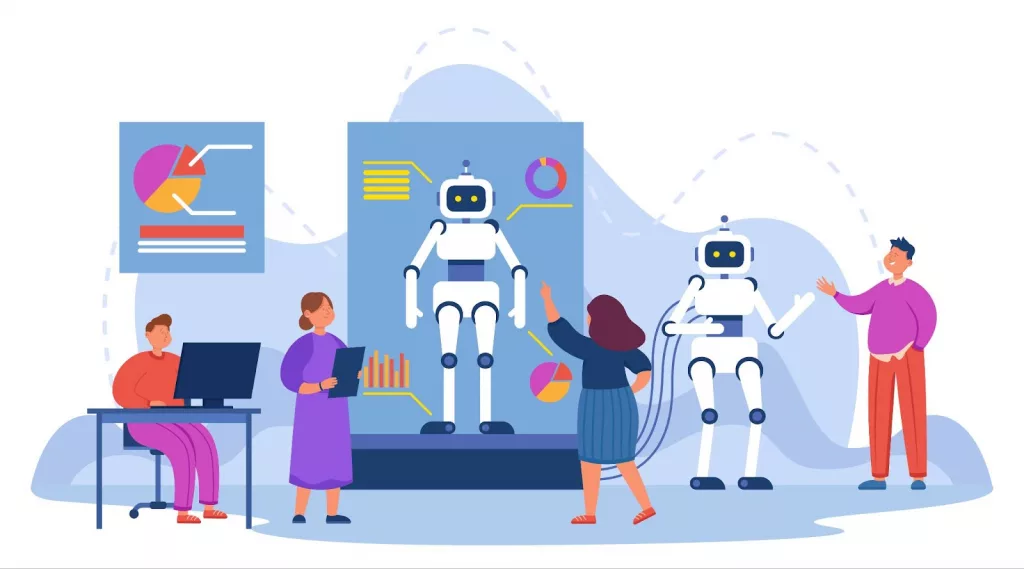In an ever-accelerating digital landscape, the role of artificial intelligence (AI) in shaping business outcomes is becoming increasingly crucial. From automating mundane tasks to opening new vistas of unexplored opportunities, the capabilities of AI are expansive. However, tapping into AI’s full potential requires more than just implementation; it demands a strategic alignment of business ideas and goals.

This blog will not only touch upon the usual suspects like automation or analytics but also dig deep into emerging, high-impact areas where AI can be the linchpin for success. Buckle up as we delve into a comprehensive, expert-level discussion on innovative AI business ideas that can redefine your enterprise strategy.
1. AI-Infused Supply Chain Management
1.1 Dynamic Route Optimization
Supply chain management has long suffered from inefficiencies, with most problems stemming from outdated, static methods. According to the top AI app development services providers, AI can rewrite this narrative by implementing dynamic route optimization algorithms that take into account real-time traffic, weather conditions, and delivery windows. Utilizing machine learning models trained on historical data, this system can dynamically update route plans, optimizing fuel consumption and reducing delivery times.
1.2 Inventory Management Through Predictive Analytics
Predictive analytics in AI can redefine how enterprises manage inventory. By continuously monitoring consumption patterns, seasonal fluctuations, and market trends, predictive models can forecast demand with astonishing accuracy. Businesses can reduce overhead costs by holding only the inventory they need, thereby reducing holding costs and spoilage.
Also read: Impact of AI on Web3 Advertising: Personalization and Privacy
2. Personalized Healthcare Solutions
2.1 AI-Driven Drug Discovery
The traditional drug discovery process is not only time-consuming but also exceedingly expensive. AI models trained on molecular biology databases can simulate drug interactions and shorten the discovery phase from years to months. These advanced algorithms can also predict potential side effects, ensuring a higher rate of success during clinical trials.
2.2 Telehealth & Remote Monitoring
The pandemic has showcased the need for robust telehealth solutions. AI can automate the diagnostic process, with natural language processing (NLP) algorithms capable of understanding spoken symptoms described by patients. These can then be cross-referenced against a medical database, providing preliminary diagnoses and treatment plans that can be fine-tuned by human doctors.
Also have a look at Healthcare Software Development Cost: Exact Price Tag
3. Advanced Data Security
3.1 Behavioral Biometrics for Fraud Detection
Fraud detection systems usually rely on predefined rules, which can generate false positives and are relatively easy for sophisticated attackers to bypass. Machine learning algorithms trained on behavioral biometrics—like typing patterns or mouse movements—can create dynamic profiles for each user, significantly enhancing security by detecting unusual behavior that could signify a potential security threat.
3.2 Secure Data Lakes
Big Data is another domain ready for an AI overhaul. Instead of conventional data storage methods that are susceptible to breaches, AI can create secure data lakes where information is not just encrypted but also tagged with machine-readable metadata. This approach facilitates advanced auditing capabilities, ensuring that any unauthorized data access can be promptly detected and traced back to its origin.
Also read: 10 Ways Data Development Platforms Can Help Dev Teams Scale
4. AI in Agriculture
4.1 Precision Agriculture
Precision agriculture isn’t a new concept, but AI takes it to the next level. Drones equipped with AI cameras can scan fields for signs of disease, irrigation issues, or pest infestations, and directly relay this information for immediate action. AI algorithms can also predict crop yields based on these factors, thereby informing resource allocation strategies.
4.2 Autonomous Farm Equipment
AI-powered autonomous tractors and harvesters are no longer a figment of imagination but a tangible reality. These machines can operate 24/7, significantly increasing agricultural productivity. Moreover, the AI systems can adapt to different terrains and crops, ensuring optimal performance with minimal human intervention.
Also read: Use of AI to improve credit score
5. AI in Renewable Energy
5.1 Predictive Maintenance for Wind Turbines
The renewable energy sector is hungry for optimization, and AI offers a banquet of opportunities. One such area is predictive maintenance for wind turbines. Traditionally, wind turbine maintenance is scheduled based on operational hours, regardless of whether the turbines actually need it. AI algorithms trained on operational data, weather conditions, and even audio-visual cues from the turbines themselves can predict when maintenance is actually required. This not only reduces downtime but also extends the lifespan of the turbine.
5.2 Intelligent Energy Storage and Distribution
Another challenge in the renewable energy sector is the efficient storage and distribution of energy. AI can manage smart grids that can dynamically allocate energy resources based on real-time demand and supply analytics. This minimizes waste and ensures that renewable energy is optimally used, reducing the need for fossil fuel backups.
Also have a look at: The Future Of Artificial Intelligence: Will We Be Ruled By Robots?
6. AI in Automotive Industry
6.1 Autonomous Freight Logistics
While self-driving cars are yet to become mainstream, AI in the form of autonomous freight logistics is ripe for adoption. Self-driving trucks equipped with state-of-the-art AI algorithms can efficiently manage long-haul deliveries. With the ability to operate 24/7 and optimize routes in real-time, this not only reduces logistical costs but also significantly shrinks delivery times.
6.2 Real-Time Manufacturing Quality Control
Quality control is an integral part of the automotive manufacturing process, but traditional methods often involve time-consuming manual inspections. AI-powered visual recognition systems can scan parts in real-time as they come off the assembly line. By learning from a database of defects, these systems can identify and flag any substandard parts instantly, thereby reducing recalls and improving brand reputation.
You may check the list of Top Offshore AI Development Companies | Best Offshore AI Developers
7. AI in Legal and Compliance
7.1 Automated Contract Analysis
Legal firms are often burdened by the task of analyzing stacks of contracts, a process that is not just time-consuming but also prone to human error. AI algorithms trained on legal terminologies and stipulations can parse through contracts, identifying obligations, entitlements, and potential liabilities. This significantly speeds up the due diligence process and minimizes the risk of oversight.
7.2 Regulatory Compliance Monitoring
With constantly changing regulations, keeping up with compliance requirements is a significant challenge for businesses. AI systems can continuously monitor changes in relevant laws and automatically flag areas where the company may be out of compliance. This proactive approach can save firms from hefty fines and legal complications.
Have a look at: Artificial Intelligence for Lawyers: Future of Lawyers & Law Firms
Final Thoughts
Incorporating AI into your business strategy is not merely about staying competitive; it’s about being a forerunner in a new era of digital transformation. The aforementioned AI business ideas are not exhaustive but illustrative of the scope and breadth that AI brings to the entrepreneurial table. Businesses willing to invest in these novel concepts today are likely to find themselves leading the pack in the AI-empowered landscape of tomorrow. If you want to learn more about how you can use AI in your business contact top AI consulting companies.
By addressing areas as diverse as supply chain efficiency, personalized healthcare, advanced data security, and even precision agriculture, AI creates an open field of opportunities ripe for exploration. The future is AI-driven, and businesses that adapt and innovate today will be the architects of this exciting new world.










Leave a Reply